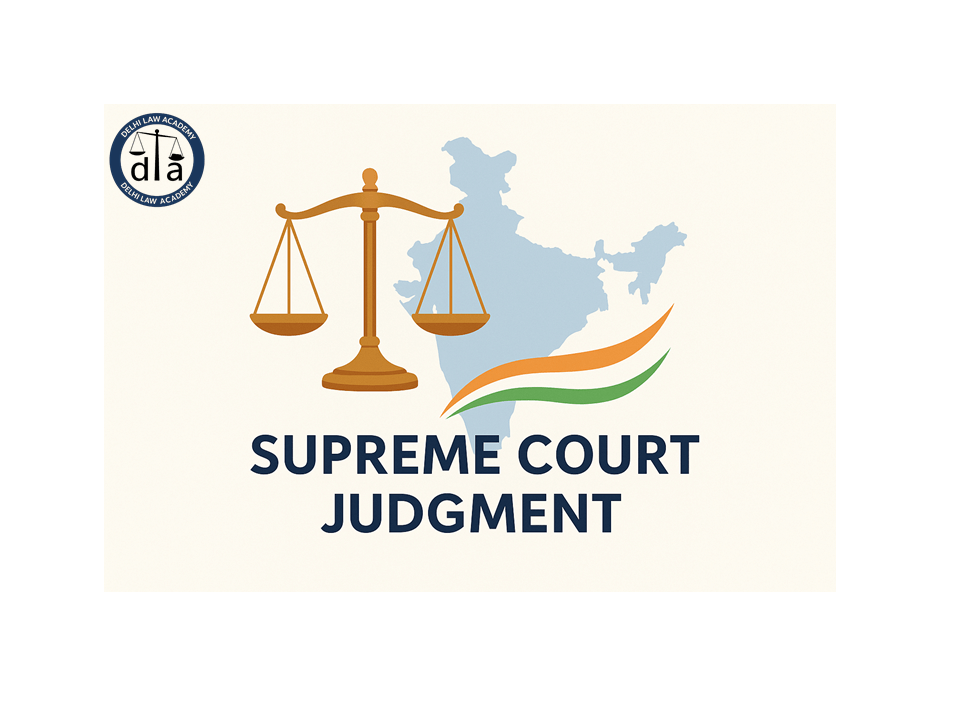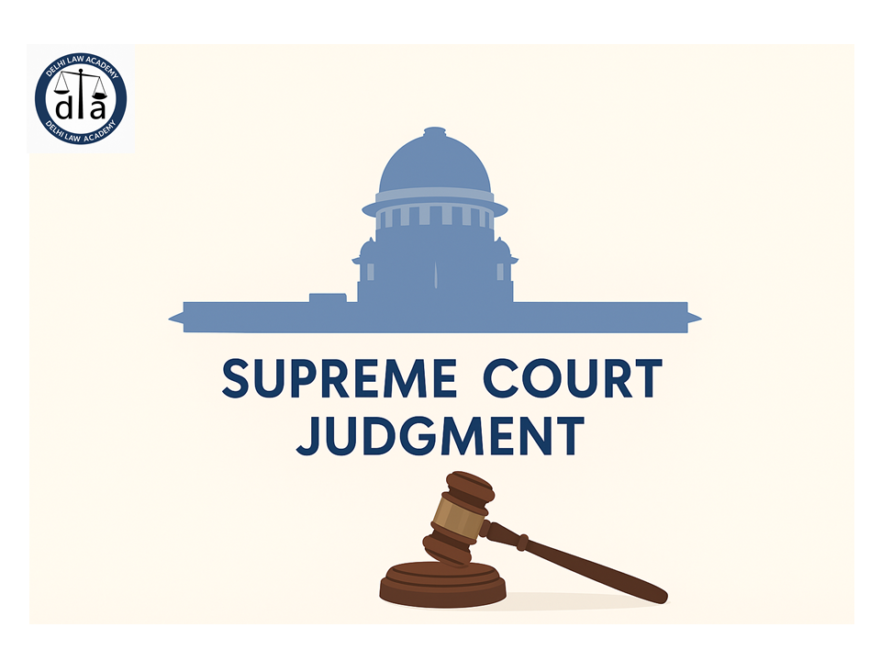
⚖️ Attempt to Overreach the Court and Present a Fait Accompli
Supreme Court Judgment: Kalyani Transco v. Bhushan Power and Steel [2025 INSC 621]
Delivered on: May 2, 2025
Delhi Law Academy Jaipur presents below for aspirants of RJS, DJS, PCS (J) and other Judicial Services throughout India a summarized version of the most recent judgment of the Supreme Court delivered on 2nd May 2025 in the case of Kalyani Transco v. Bhushan Power and Steel, deprecating any attempt to overreach the court and present a fait accompli.
The Supreme Court has strongly disapproved attempts by litigants to overreach the Court and present a fait accompli in the following terms:
“…no party can be permitted to deliberately create a situation where the proceedings in the Court would be frustrated or the Court’s decision would become irrelevant or ineffective. A situation of fait accompli cannot be permitted to be created in the Court to frustrate the proceedings….”
📄 Relevant Extracts from the Judgment
1. Background
This batch of Appeals stems from the common impugned National Company Law Appellate Tribunal (NCLAT), New Delhi in the Company Appeals filed by the various parties.
2. Observations on Equity Commitment
Except bare submissions made by the learned advocates during the course of hearing, there is no material or affidavit placed on record by the Respondent JSW to show that the Equity Commitment as contemplated in the aforestated clauses, which was condition precedent, was fulfilled by it. There is also no material placed on record by it to show that the Effective date as contemplated in its Resolution Plan was extended after the order of NCLT or NCLAT as per Clause 3.1 of the Resolution Plan. There is nothing on record to show as to how, when and by whom the Effective date as contemplated in the Resolution Plan was extended. If the Effective date was surreptitiously extended by some lenders, claiming to be part of CoC which had become functus officio and which had no authority to do so, any payment made or Equity infused by JSW under the garb of such decision cannot be vindicated by the Court. When the SRA-JSW, CoC and Resolution Professional are being represented by very eminent Advocates, non-production of such relevant material with regard to infusion of Equity and extension of Effective date, to substantiate their submissions, cannot be without any purpose. It therefore raises serious doubts about the legality of such actions and genuineness of the so-called compliance of Resolution Plan, pending these Appeals.
3. Fait Accompli Not Permitted
Even it is assumed for the sake of arguments that pending the present Appeals, the terms of the Resolution Plan have been complied with, it may be noted that no party can be permitted to deliberately create a situation where the proceedings in the Court would be frustrated or the Court’s decision would become irrelevant or ineffective. A situation of fait accompli cannot be permitted to be created in the Court to frustrate the proceedings, more particularly when the CIR proceedings had ex facie stood vitiated on account of non-compliance of the mandatory provisions of law and on account of the misuse of the process of law by the parties. Any action taken or any deal/any settlement entered into by and between the parties in respect of the subject matter of the proceedings, have to pass the test of judicial scrutiny and would always be subject to the final outcome and adjudication of the proceedings.
4. Role of Committee of Creditors (CoC)
Though the commercial wisdom of the CoC should have been given primacy in any adjudicatory proceedings, the changing stance of CoC from time to time during the course of proceedings right from the holding of meetings for approving the Resolution Plan of JSW till the final hearing of the present Appeals, has led this Court to believe that the CoC also has played a very dubious role in the entire CIRP. Such contradictory stands taken by the CoC at various stages of proceedings clearly proves that CoC had played foul and had not exercised its commercial wisdom in the interest of the Creditors.
5. Misuse of Process of Law by JSW
Now, a situation of fait accompli is sought to be presented before this Court by the learned Senior Advocate Mr. Neeraj Kishan Kaul appearing for JSW by submitting that pending the present Appeals, the Resolution Plan has been fully implemented. In the Court’s opinion, nobody should be permitted to misuse the Process of law nor take undue advantage of the pendency of any proceedings in any Court or Tribunal. Instituting vexatious and frivolous litigations in the NCLT or NCLAT and delaying the implementation of Resolution Plan under the garb of pendency of proceedings, has clearly proved mala fide and dishonest intention on the part of JSW, in firstly securing highest score making misrepresentation before CoC and then not implementing the same under the garb of pendency of proceedings, though the Resolution Plan was supposed to be unconditional. Such acts of misuse and abuse of process of law cannot be vindicated by this Court, which otherwise would tantamount to ratifying and pardoning the illegal acts committed by JSW and thereby giving them a clean chit.
6. Conclusion on Fait Accompli
An illegality of any nature cannot be permitted to be perpetuated, and a plea of fait accompli cannot be permitted to be raised by any party to cover up their illegal acts after achieving the ill-motivated intentions circumventing the law. It is pertinent to note that though all throughout from the date of order passed by the NCLT till March 2021, the stand of JSW evidenced through an affidavit was that it was not obliged to implement the plan because of the pendency of these Appeals, however JSW played smart by making part payment to the Financial Creditors in March 2021, realizing the beneficial market trend of the Steel. It also surreptitiously got the Effective date extended to 31.03.2021 from the so-called core group of CoC, which had already become functus officio and had no authority to extend the said Effective date.
📚 Further Reading for Law Aspirants
Explore more useful resources from Delhi Law Academy to strengthen your preparation:
💡 Frequently Asked Questions (FAQs)
“Fait accompli” is a French term meaning a situation that has already been completed or accomplished, leaving no option for reversal. In Indian law, courts disapprove of any attempt by a party to create a *fait accompli* to render judicial proceedings meaningless or ineffective.
The Supreme Court firmly held that no litigant can overreach the court or take steps to make its decision redundant. It warned against creating a *fait accompli* situation during pending appeals, calling such acts misuse of the judicial process.
The Court criticized JSW for allegedly extending the “Effective Date” without proper authority and for making partial payments to creditors while the case was sub judice. The Court viewed this as an attempt to misuse the process of law and present a *fait accompli*.
This case serves as a precedent under the Insolvency and Bankruptcy Code (IBC), highlighting that commercial wisdom of the Committee of Creditors (CoC) must not be misused. It underscores judicial oversight to prevent illegal or dishonest resolutions.
“Overreaching the Court” means taking actions outside the court’s supervision or contrary to its orders to gain undue advantage. The Supreme Court clarified that such conduct amounts to contempt and cannot be tolerated in judicial proceedings.
It provides a vital example of judicial control over corporate misconduct, illustrating key doctrines like *fait accompli*, *abuse of process*, and *overreaching the court*. Law students and judiciary aspirants can use this case to understand applied principles of judicial propriety and ethics.
Contact us
📍 Delhi Law Academy – Jaipur Branch
6C, Tower 2, Coaching Hub, Pratap Nagar, Jaipur – 302033
📞 Phone:
+91 9911916552
+91 8447285606
✉️ Email:
contactus@delhilawacademy.com

